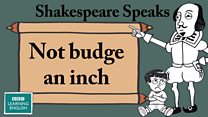Unit 21: English You Need
Exams, news, pronunciation, teachers' tips, learners' questions
Select a unit
- 1 English You Need
- 2 English You Need
- 3 English You Need
- 4 English You Need
- 5 English You Need
- 6 English You Need
- 7 English You Need
- 8 English You Need
- 9 English You Need
- 10 English You Need
- 11 English You Need
- 12 English You Need
- 13 English You Need
- 14 English You Need
- 15 English You Need
- 16 English You Need
- 17 English You Need
- 18 English You Need
- 19 English You Need
- 20 English You Need
- 21 English You Need
- 22 English You Need
- 23 English You Need
- 24 English You Need
- 25 English You Need
- 26 English You Need
- 27 English You Need
- 28 English You Need
- 29 English You Need
- 30 English You Need
Session 1
Are you working towards an important exam? We're here to help with a series of videos that pick out some top tips for studying and taking exams.
Activity 1
Exam skills: 6 more tips to help with grammar accuracy
When is accuracy important?
Using grammar with accuracy means not making many mistakes – but how can you improve your grammar and how accurate do you really need to be?
Watch this video to find out six top tips to help you improve your grammar accuracy. Then test your understanding in our quiz.
[Images: Getty Images]
Watch the video

Rob
Using grammar with accuracy means not making many mistakes – but how can you improve your grammar and how accurate do you really need to be? Our top tips will hopefully help you out.
The first thing to remember is that mistakes are ok – but think about why you made them and then try to improve on them. You could research the areas that you make mistakes in or you could ask for help from a teacher or a more fluent-speaking friend.
Accuracy is not always important – in some situations you may want to focus on what you want to communicate rather than how accurately you do so. It's better to say something rather than not because you're worried about making mistakes.
But accurate grammar is important in certain situations – like in exams, where accurate grammar will get you higher marks. To prepare you for exams, concentrate on aspects of grammar you personally find more difficult. Also, you're likely to be more accurate if you don't rush your English – take your time and think about what you say or write.
Serious grammar mistakes can sometimes prevent you from communicating your ideas to other people – or it can make your writing very difficult to understand.
So always check your writing and think about what you're going to say before you speak. Grammar mistakes can also give a bad impression if, for example, you make errors in your CV or professional emails or letters.
Finally, as we've said before, listen to English being spoken and read English material regularly. This will help you hear and see the correct use of the language.
Good luck!
______________________________________________________________________________________
Did you like that? Why not try these?


 ________________________________________________________________________________________________________
________________________________________________________________________________________________________
Here's a summary of our tips to help improve your grammar accuracy:
- Learn from your mistakes
- Accuracy isn't always a priority
- Concentrate on grammar you find most difficult
- Take your time
- Don't create a bad impression!
- Listen to and read English material regularly
To do
So what did you discover? Find out by taking our test…
How can you help improve your grammar accuracy?
4 Questions
Answer these 4 questions
Help
Activity
Answer these 4 questions
Hint
What do we learn from?Question 1 of 4
Help
Activity
Answer these 4 questions
Hint
You want to make a good impression!Question 2 of 4
Help
Activity
Answer these 4 questions
Hint
Take your time.Question 3 of 4
Help
Activity
Answer these 4 questions
Hint
What do you want to say?Question 4 of 4
Excellent! Great job! Bad luck! You scored:
Next
Our BBC Learning English 6 Minute Grammar podcasts can also help you improve your grammar.
This BBC Skillswise webpage has some general advice about grammar.
Have you got any tips about learning strategies and exam preparation that you can share with us? Please email them to us at learningenglish@bbc.co.uk with 'Exam Skills' in the subject line. We will post our favourites here and on our Facebook page. Please note that we can’t reply to individual emails, but we do read all of them.
End of Session 1
Next, join us for News Review, where we'll bring you key words and phrases from the latest stories and show you how to use it in your everyday English.
Session Vocabulary
accuracy
ability not to make mistakesaspects
particular parts or features
CV (curriculum vitae)
a document listing your qualifications and the jobs you have
had in the past that you send to someone when you are applying for a job.